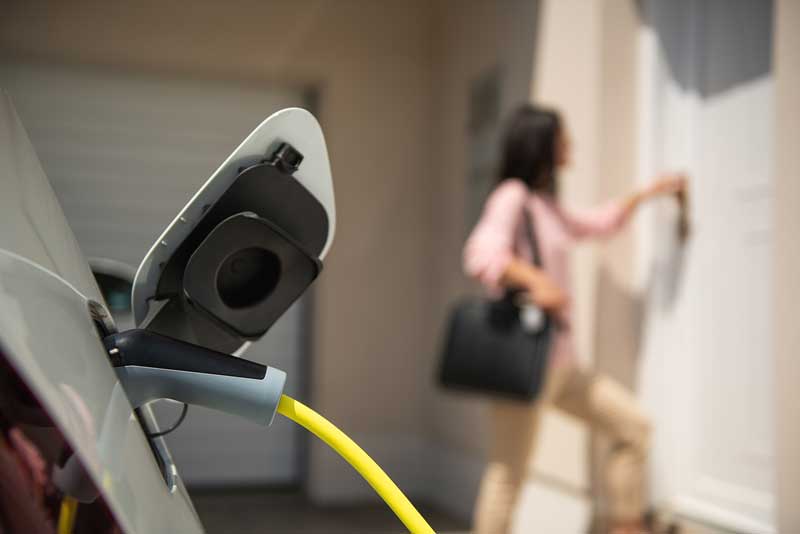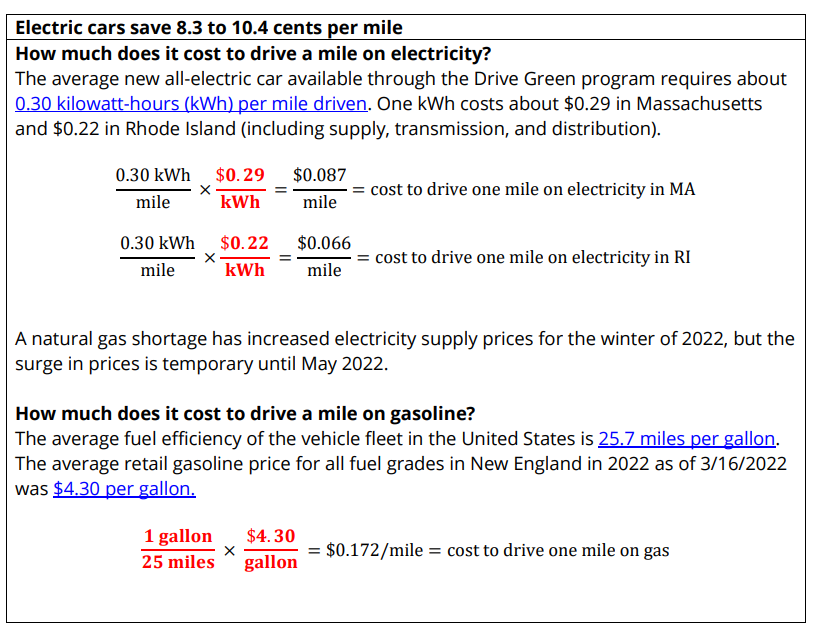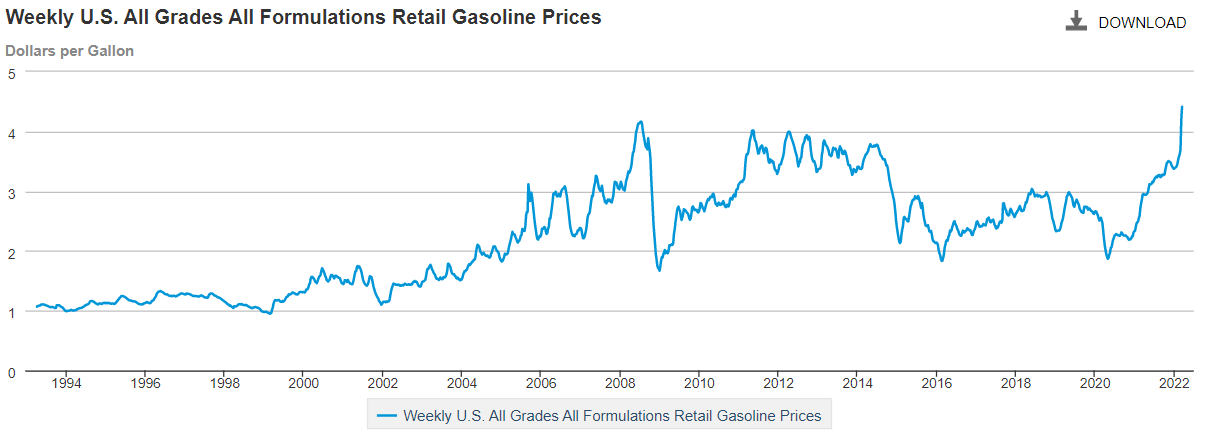-png.png)
The fast rise in gas prices is making lots of people consider switching to an electric vehicle. It is cheaper to drive a mile on electricity than it is to drive a mile on gasoline everywhere in the US. The average driver in Massachusetts or Rhode Island saves about $600 in a typical year by switching to an electric car for two reasons:
- Electricity is cheaper than gasoline
- Electric cars are more efficient, so they consume less energy to travel the same number of miles
Drivers want to know how much they might save by choosing an electric vehicle the next time they’re car shopping. There’s no single answer, as the number will change depending on how much you drive, the efficiency of the car you’re replacing, and the gas price, which swings wildly.
We know that trying to figure out an apples-to-apples comparison of electricity and gasoline costs can be tricky. Here’s our math that shows two ways to help understand fuel savings for driving an electric car.
How much does electricity cost compared to a gallon of gasoline?
Your electricity bill charges you according to how much energy you use, measured in kilowatt-hours (kWh). Electricity costs about 22-29 cents per kilowatt-hour depending on where you live in Massachusetts or Rhode Island, including supply, transmission, distribution, and all of the other components listed on your monthly bill. How does the electric rate compare to gasoline?
The e-gallon is a methodology developed by the Department of Energy to compare the cost of electricity to fuel an EV to the cost of gasoline on an apples-to-apples basis.
-png.png)
That means gasoline has to fall below $2.25 per gallon to be cheaper than an EV. In Rhode Island, the price of gas has to fall below $1.98 to be cheaper. And because electricity supply rates are more stable compared to gasoline, the e-gallon value won’t shift around as much as gasoline.
How much will my electricity bill go up?
 The e-gallon is a good single number to keep in mind when comparing fuel costs. But lots of drivers want to know exactly how much their electricity bill will go up and how much their gasoline bill will go down if they switch to an EV. The answer will depend on the efficiency (MPG) of the car you drive now, how many miles you drive, and the cost of fuel. Based on the values used in the table below, it costs…
The e-gallon is a good single number to keep in mind when comparing fuel costs. But lots of drivers want to know exactly how much their electricity bill will go up and how much their gasoline bill will go down if they switch to an EV. The answer will depend on the efficiency (MPG) of the car you drive now, how many miles you drive, and the cost of fuel. Based on the values used in the table below, it costs…
- 14 cents per mile to drive on gasoline
- 6 cents per mile in RI and 8.7 cents per mile in MA to drive on electricity.
That means drivers can expect to save $635 to $958 annually, depending on where they live.
*Yes, gas prices have reached $4.30 and are still climbing. EV drivers are saving way more right now than usual. But the point here is that electricity will save drivers a substantial amount of money even when gas prices are normal.
Our math and assumptions to calculate per-mile costs are updated periodically and linked here. Under the current gas price of $4.30 per gallon, EV drivers are saving 8.3 to 10.4 cents per mile compared to drivers of gas-powered cars. That translates to about $20 per week in savings. If gas prices stay at $4.30 for a whole year, savings will reach $1,000 annually.

You can get a personalized number for yourself by plugging in your own values for the price of elecricity, the MPG of your gas car, and the current gas prices into our math above.
EVs also save money through reduced maintenance. According to a study by Consumer Reports, EV drivers typically spend half as much on maintenance over vehicle lifetime compared to gas car drivers.
How can all drivers access the fuel savings of an Electric vehicle?
Gasoline is one of the most price-volatile commodities in the world. The recent price increase is not the first time that drivers’ budgets have been hurt by gasoline, and unfortunately, it probably won’t be the last time. Consumers will remain vulnerable to the wild price swings of gasoline until everyone has access to an EV, transit, or biking/walking options, and that's not a reality for many drivers struggling with transportation costs right now.
Source: US Energy Information Administration
The climate crisis and high gasoline prices are creating a heightened sense of urgency to consider alternatives to gasoline. 2022 could be a great year for launching a broad menu of policies to help all drivers access the fuel savings of an EV. Join us for an upcoming webinar to learn about our advocacy efforts to begin a phaseout of gasoline in 2030.

-png.png)
-png.png)
 The e-gallon is a good single number to keep in mind when comparing fuel costs. But lots of drivers want to know exactly how much their electricity bill will go up and how much their gasoline bill will go down if they switch to an EV. The answer will depend on the efficiency (MPG) of the car you drive now, how many miles you drive, and the cost of fuel. Based on the values used in the table below, it costs…
The e-gallon is a good single number to keep in mind when comparing fuel costs. But lots of drivers want to know exactly how much their electricity bill will go up and how much their gasoline bill will go down if they switch to an EV. The answer will depend on the efficiency (MPG) of the car you drive now, how many miles you drive, and the cost of fuel. Based on the values used in the table below, it costs…


Comments